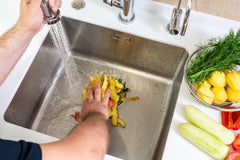Having a functional garbage disposal is a must for any busy kitchen. This handy appliance makes cleaning up after meals a breeze, helping you manage waste efficiently. But when your disposal gets clogged, it can feel like your kitchen comes to a standstill. Unfortunately, clogs are a pretty common issue, which can disrupt the system and lead to unpleasant odors or worse clogs if not addressed promptly.
There are many reasons your garbage disposal might get clogged, often depending on what's been thrown into it. Luckily, most clogs are fixable with a bit of effort and some household tools. Understanding how to address these clogs not only helps in resolving the issue but also ensures the appliance continues to work effectively for years to come. So, let's dive into how to identify the problem and get your disposal back in action.
Identifying the Problem
A clogged garbage disposal can show itself in a few different ways. Recognizing these signs can save you from more significant troubles down the road:
- Your sink drains slowly.
- You notice a foul odor coming from the sink.
- The disposal makes unusual noises when turned on.
- Water backs up into the sink when the disposal is running.
Understanding what typically causes these clogs can help prevent them. Some common culprits include:
1. Grease and Fat: When you pour fats and oils down the drain, they can solidify and create clogs. It's best to dispose of these in the trash.
2. Fibrous Foods: Foods like celery or corn husks have long fibers that can wrap around blades and cause the motor to jam.
3. Bones and Pits: Hard materials such as bones or fruit pits can damage the blades and lead to blockages.
4. Starchy Foods: Items like pasta or rice can expand and become gummy, leading to stubborn clogs.
Once you've pinpointed the likely cause of the issue, you can move on to some quick solutions that will help get your garbage disposal back in working order.
Quick Solutions to Unclogging Your Garbage Disposal
Before getting started on any fixes, always make sure to cut off the power to the garbage disposal. This step is vital for your safety, as it prevents accidental operation while you're working. Once you've completed this, you can try a few methods to clear the clog.
1. Use Baking Soda and Vinegar: This natural solution can help break down minor clogs. Start by pouring half a cup of baking soda into the disposal, followed by a cup of vinegar. Allow the mixture to fizz for a few minutes before rinsing it out with hot water.
2. Try a Plunger: A plunger isn’t just for toilets; it can be a handy tool for unclogging your disposal too. Fill the sink partially with water and use the plunger to apply pressure. This might be enough to dislodge the clog.
3. Use a Wrench: Most disposals come with a small wrench that fits into a hex-shaped hole on the underside of the unit. By turning the wrench back and forth, you can manually move the blades and possibly free the obstruction.
When these solutions don't do the job, it might be time to consider preventive measures to keep your disposal running smoothly in the future.
Preventive Measures
Preventing clogs is always easier than fixing them. By following a few simple tips, you can keep your garbage disposal free from troublesome blockages:
- Watch What You Put In: Avoid putting grease, fibrous foods, and hard items into the disposal. These materials are leading causes of clogs.
- Run Cold Water: Always use cold water when grinding food waste. Cold water keeps fats solid, helping them to be chopped up and flushed away without binding to the pipes.
- Regular Cleaning: Every now and then, grind ice cubes in the disposal. This helps clean the blades and remove any stuck debris. You can add a few citrus peels afterward to give your disposal a fresh scent.
With these practices, you can reduce the chances of facing bothersome clogs, but sometimes, professional help is necessary.
When to Call a Professional
Even the best efforts can't solve every problem. If your disposal still seems stuck, or you notice strange noises or persistent clogs, it may indicate a more serious issue. Here's when to consider reaching out to a professional:
- Unusual Sounds: Grinding or metal-on-metal noise suggests something is amiss inside.
- Persistent Clogs: If clogs keep happening despite your best efforts, there might be a deeper plumbing issue.
- Leaks: Water pooling under the sink is a definite sign something needs attention.
Calling a specialist ensures your garbage disposal and plumbing are inspected and repaired properly, giving you peace of mind.
Keep Your Garbage Disposal Running Smoothly
Maintaining a clog-free garbage disposal is all about good practices and timely interventions. With simple solutions and preventive measures, you can keep your kitchen humming along without hiccups. Remember, regular maintenance is your best friend, and when things get tricky, professionals are ready to lend a hand. Keeping these tips in mind will make sure your disposal remains a reliable tool in your kitchen arsenal.
Keep your kitchen moving efficiently by addressing clogs before they become a major issue. Discover effective solutions for unclogging garbage disposals with The Shroom Company's innovative range of products. By adopting the right preventive measures, you'll ensure your disposal functions smoothly, saving you time and stress in the long run. Enhance your kitchen's performance with tools designed to keep blockages at bay.




0 comments